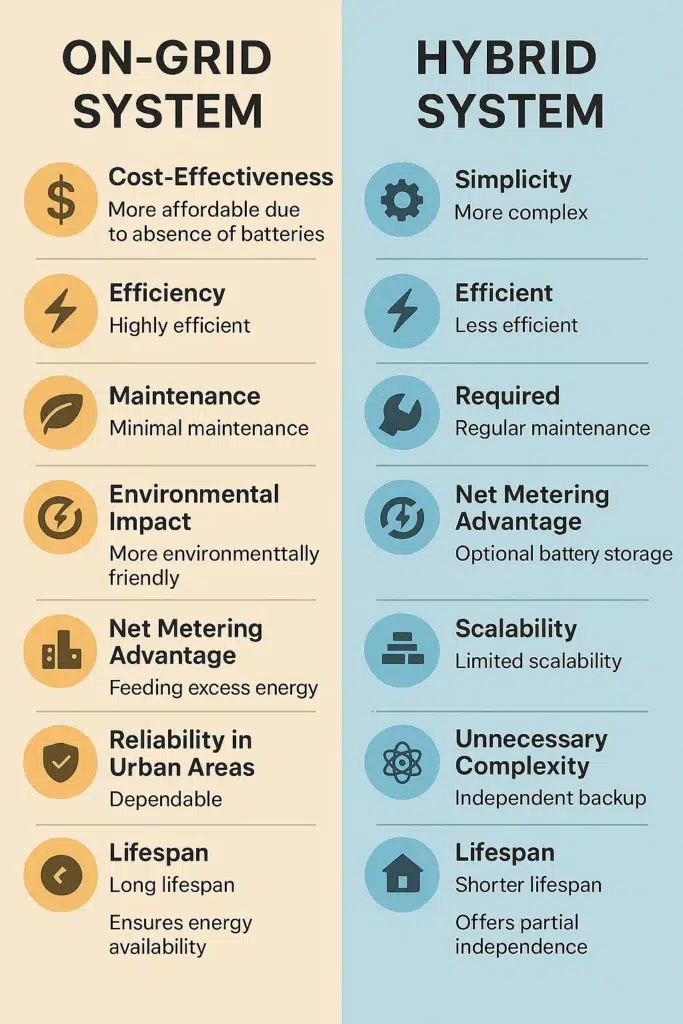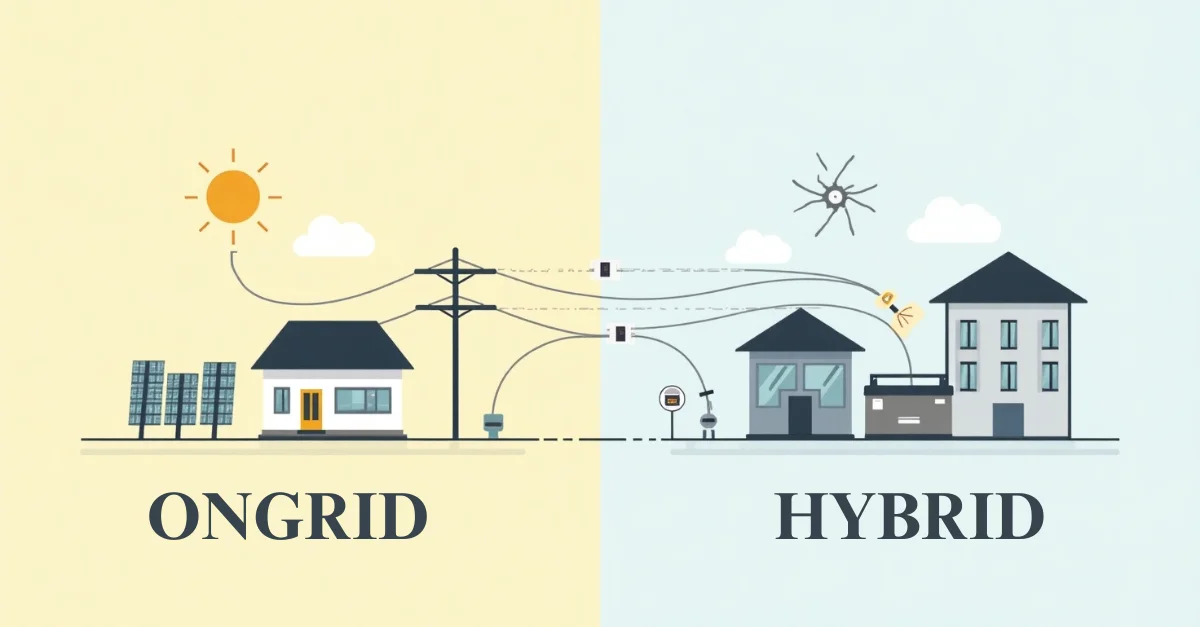Hybrid vs. On-Grid Solar Systems: Key Differences
Are you considering going solar but worried about which system will suit your home best? Here is a concise comparison of Hybrid and On-Grid solar systems to make it easier for you.
- Cost-Effectiveness
On-Grid System
For those on a budget, look no further. On-grid systems are more cost-effective because they require no batteries. As these systems are connected to the grid, your energy expenses also decrease.
Hybrid System
At an additional cost, Hybrid systems do offer more. Batteries and special inverters allow the user to store energy for future use (for example, during load shedding). When it comes to these perks, the downsides are that batteries are costly and may need replacing every few years.
- Simplicity
On-Grid System
These systems are easier to set up and require little maintenance. Fewer parts translate to fewer complications—and reduced servicing costs.
Hybrid System
More flexibility comes at the price of more complexity. Batteries require maintenance, routine inspections, and occasional repairs. If power cuts are an issue for you, this becomes a good option, but managing it does require more effort.
Here’s a comparison that highlights the advantages of an on-grid system over a hybrid system:

3. Efficiency
- On-Grid System: Highly efficient as it directly uses or feeds solar energy into the grid without storage losses.
- Hybrid System: Less efficient due to energy losses during battery charging and discharging processes.
4. Maintenance
- On-Grid System: Minimal maintenance since there are no batteries, which are often the most failure-prone component of hybrid systems.
- Hybrid System: Requires ongoing battery maintenance and eventual replacement, increasing long-term costs and complexity.
5. Environmental Impact
- On-Grid System: More environmentally friendly as it doesn’t involve batteries, which have significant environmental costs during manufacturing and disposal.
- Hybrid System: Batteries contribute to environmental challenges due to resource extraction, manufacturing, and disposal processes.
6. Net Metering Advantage
- On-Grid System: Allows you to feed excess energy into the grid and receive credit, effectively reducing your electricity bills.
- Hybrid System: Although it can use net metering, it prioritizes battery storage, which may not fully capitalize on the financial benefits of feeding energy into the grid.
7. Scalability
- On-Grid System: Easier to scale up by simply adding more panels or upgrading the inverter. No need to consider battery storage capacity.
- Hybrid System: Limited scalability as battery capacity and inverter specifications need to match the increased load.
8. Reliability in Urban Areas
- On-Grid System: Perfect for locations with stable grid connections, making it a dependable and economical choice for urban and suburban areas.
- Hybrid System: Unnecessary complexity for areas with reliable grids, as the backup power feature may rarely be used.
9. Energy Independence
- On-Grid System: While it relies on the grid, it ensures energy availability as long as the grid is operational, with no concerns about battery depletion.
- Hybrid System: Offers partial independence but at the cost of higher expenses and lower efficiency.
10. Lifespan
- On-Grid System: Solar panels and inverters typically last 20-25 years with minimal degradation, and no batteries mean fewer replacements.
- Hybrid System: Batteries have a much shorter lifespan (5-10 years) and will need replacement multiple times during the system’s life.
Conclusion:
Alright, let’s keep it real. If your power never flakes out, just go with an on-grid solar setup. Seriously, why complicate life? It’s cheaper, you barely have to mess with it, and, hey, no need to babysit a bunch of batteries. You just slap those panels on, and boom—your bills take a nosedive.
But, if your lights play hide-and-seek because the grid’s a hot mess where you live, yeah, then a hybrid system with batteries actually makes sense. It’ll keep your Netflix binge going when everyone else is lighting candles, but, man, those batteries aren’t cheap. Plus, you’re signing up for extra costs down the road.
Honestly, in the city or any place where the wires aren’t held together with duct tape, stick with on-grid. Less drama, less maintenance, good for the planet, what’s not to love?
RELATED: 10KW On Grid Solar System Price in Pakistan in 2025

